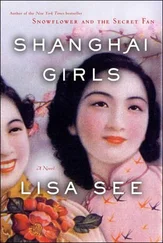Lisa See - Peony in Love
Здесь есть возможность читать онлайн «Lisa See - Peony in Love» весь текст электронной книги совершенно бесплатно (целиком полную версию без сокращений). В некоторых случаях можно слушать аудио, скачать через торрент в формате fb2 и присутствует краткое содержание. Жанр: Старинная литература, на английском языке. Описание произведения, (предисловие) а так же отзывы посетителей доступны на портале библиотеки ЛибКат.
- Название:Peony in Love
- Автор:
- Жанр:
- Год:неизвестен
- ISBN:нет данных
- Рейтинг книги:4 / 5. Голосов: 1
-
Избранное:Добавить в избранное
- Отзывы:
-
Ваша оценка:
- 80
- 1
- 2
- 3
- 4
- 5
Peony in Love: краткое содержание, описание и аннотация
Предлагаем к чтению аннотацию, описание, краткое содержание или предисловие (зависит от того, что написал сам автор книги «Peony in Love»). Если вы не нашли необходимую информацию о книге — напишите в комментариях, мы постараемся отыскать её.
Peony in Love — читать онлайн бесплатно полную книгу (весь текст) целиком
Ниже представлен текст книги, разбитый по страницам. Система сохранения места последней прочитанной страницы, позволяет с удобством читать онлайн бесплатно книгу «Peony in Love», без необходимости каждый раз заново искать на чём Вы остановились. Поставьте закладку, и сможете в любой момент перейти на страницу, на которой закончили чтение.
Интервал:
Закладка:
“I titled the poems I left behind Manuscripts Saved from Burning, ” Xiaoqing said, in a voice that sounded as melodious as wind chimes, “but what’s extraordinary in that? The men who write about us call us lovesick.
They say we are the sickly sex, always suffering from blood loss and body ( 1 2 7 )
depletion. The result, they conclude, is that our fates must match those of our writings. They don’t understand that fires aren’t always an accident.
Too often women—and I count myself among them—doubt their words and skill, so they decide to burn their work. This is why so many collections have the exact same title.”
Xiaoqing regarded me, waiting for me to say something. The other lovesick maidens also looked at me expectantly, urging me with their kind eyes to be clever.
“Our writings don’t always pass away like a spring dream,” I said.
“Some remain in the earthly realm where people weep over them.”
“May they do so for ten thousand years,” the salt merchant’s daughter added.
Xiaoqing looked at us benignly. “Ten thousand years,” she repeated.
She shivered and the air around her trembled in response. “Don’t be so sure. They’re beginning to forget about us already. When that happens . . .” She stood. Her gown billowed around her. She nodded to each of us, then drifted away.
The lovesick maidens left when Grandmother arrived, but what comfort could that old woman offer me? “There is no such thing as love,” she liked to say, “only obligation and responsibility.” Her words about her husband were always bound by duty, not love or even affection.
Forlorn and disconsolate, I listened to Grandmother—she talked about nothing in particular—and watched the New Year’s preparations in Ren’s home. He paid his family’s debts; his mother swept and cleaned; servants prepared special foods; and the picture of Kitchen God, which hung above the stove, was burned and sent here to report on the good and bad deeds of the family. No thought was given to me.
Reluctantly, I turned my eyes to my natal family home. My father had returned from his posting in the capital to perform his filial duties. Bao, my brother of seven years, had married in. Disappointingly, his wife had only succeeded in birthing three stillborn sons. Whether it was from this failure or from a general weakness of character, Bao had taken to spending most of his time with pleasure women along the shores of West Lake. My father didn’t seem perturbed by this, as he and my mother went to the family graveyard on New Year’s Eve to invite the ancestors home for the holiday.
Baba wore his mandarin robes with great dignity. The elaborately embroidered emblem on his chest told anyone who saw him of his rank and ( 1 2 8 )
importance. He carried himself with far greater assurance than he had when I’d been a daughter in the household.
My mother seemed far less secure. Mourning had caused her to age.
Her hair was now streaked with white and her shoulders seemed thin and brittle.
“Your mother still cares for you,” Grandmother said. “This year she will break with tradition. She’s a very brave woman.”
I couldn’t imagine my mother doing anything that strayed from the Four Virtues and Three Obediences.
“You left her childless,” Grandmother went on. “Her heart fills with grief whenever she sees a book of poetry or catches the scent of peonies.
These things remind her of you and are a heavy burden on her heart.”
I didn’t want to hear this. What good would it do me? But my grandmother didn’t often attend to my feelings.
“I wish you’d known your mother when she first married into our family,” Grandmother continued. “She was just seventeen. She’d been highly educated and her womanly skills were flawless. It’s a mother-in-law’s duty, obligation, and reward to complain about her daughter-in-law, but your mother did not allow me this gift. I didn’t mind. I had a house full of sons. I was happy to have her company. I came to look at her not as a daughter-in-law but as a friend. You can’t imagine the places we went and the things we did.”
“Mama doesn’t go out,” I reminded her.
“She did in those days,” she countered. “In the years leading up to the fall of the Ming emperor, your mother and I questioned the true nature of a woman’s calling. Was it the traditional womanly arts that she so excelled at or was it her adventurousness, her curiosity, and her beautiful mind?
Your mother, not your father, was the first to take an interest in the women poets. Did you know that?”
I shook my head.
“She felt it was the responsibility of women to collect, edit, antholo-gize, and critique the work of others like ourselves,” Grandmother continued. “We traveled many places in search of books and experience.”
This seemed far-fetched. “How did the two of you go? Did you walk?”
I asked, trying to make her stop her exaggerations.
“We practiced walking in our rooms and in the corridors in the villa,”
she answered, smiling at the memory. “We toughened our golden lilies so they wouldn’t hurt, and what pain we still experienced was soothed by the ( 1 2 9 )
pleasures of what we saw and did. We found men who were so proud of the women in their families that they published their writings to memori-alize the domestic bliss in their households, establish the family’s sophistication, and honor their wives and mothers. Like you, your mother stored in her heart all the plunder of her readings, but she was modest in her own writing. She refused to use ink and paper, preferring instead to mix powder with water and then write on leaves. She wanted to leave behind no trace of herself.”
Below us, New Year’s Day arrived. In our ancestral hall, my parents laid out trays of meats, fruits, and vegetables, and I watched as my grandmother’s flesh began to fill out. After the ceremony, Mama took three small rice balls, went to my old room, and left them on the windowsill.
For the first time in seven years I was fed. Just three rice balls and I was strengthened.
Grandmother looked at me and nodded knowingly. “I told you she still loves you.”
“But why now?”
Grandmother ignored my question and continued her earlier topic with renewed fervor. “Your mother and I went to poetry parties held under the full moon; we traveled to see jasmine and plum blossoms in bloom; we went to the mountains and made rubbings of stone stelae at Buddhist retreats. We rented pleasure boats and journeyed on West Lake and along the Grand Canal. We met women artists who supported their families with their paintings. We dined with professional women archers and celebrated with other gentry women. We played instruments, drank late into the night, and wrote poetry. We had fun, your mother and I.”
When I shook my head in disbelief, Grandmother observed, “You’re not the first girl not to know her mother’s true nature.” She seemed pleased that she’d surprised me, but her pleasure was brief. “Like so many women in those days, we enjoyed the outer realm, but we knew nothing about it. We employed our calligraphy brushes and had our parties. We laughed and sang. We didn’t pay attention to the Manchus’ southward trek.”
“But Baba and Grandfather knew what was coming,” I cut in.
Grandmother tightened her arms over her chest. “Look at your father now. What do you think?”
I hesitated. I’d come to regard my father as someone without loyalty, either to our Ming emperor or to his only child. His lack of deep feelings for me still hurt, but my emotions hadn’t kept me from observing him.
( 1 3 0 )
No, not at all. Some perverse place inside me wanted to see him. Watching Baba was like picking at a sore. I turned to look for him now.
Читать дальшеИнтервал:
Закладка:
Похожие книги на «Peony in Love»
Представляем Вашему вниманию похожие книги на «Peony in Love» списком для выбора. Мы отобрали схожую по названию и смыслу литературу в надежде предоставить читателям больше вариантов отыскать новые, интересные, ещё непрочитанные произведения.
Обсуждение, отзывы о книге «Peony in Love» и просто собственные мнения читателей. Оставьте ваши комментарии, напишите, что Вы думаете о произведении, его смысле или главных героях. Укажите что конкретно понравилось, а что нет, и почему Вы так считаете.












